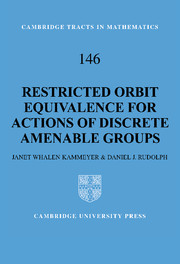6 - m-joinings
Published online by Cambridge University Press: 04 August 2010
Summary
Polish topologies
Our objective here is to produce a topological model for arrangements and rearrangements. We seek a single action of G by homeomorphisms of a topological space on which there is a canonical notion of a base arrangement and a rearrangement of it given as continuous functions. We want this model to be sufficiently large that any example of a measure space, an arrangement and rearrangement will be conjugate to this model space for a particular choice of measure. Thus to move from one measurable example to another is to choose a different invariant measure on the model. This will allow us to topologize the set of all rearrangements by a weak*-topology on this space of measure. To accomplish this, the topological space must be rather elaborately defined, and in particular cannot be compact.
Sufficient to our purposes though they will all be Polish spaces in that the topological space is metrizable and, for some choice of metric, is complete and separable. Usually we will give explicit metrics for these spaces, and quite often they will not be complete for that metric, but will always sit as residual subsets of their completion, as this is a universal property independent of the choice of metric. We will rely in an essential way on the results of Varadarajan that the space of probability measures on a Polish space is again a Polish space in the weak*-topology of convergence on bounded continuous functions.
- Type
- Chapter
- Information
- Publisher: Cambridge University PressPrint publication year: 2002

